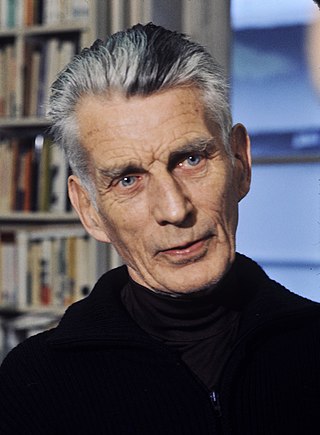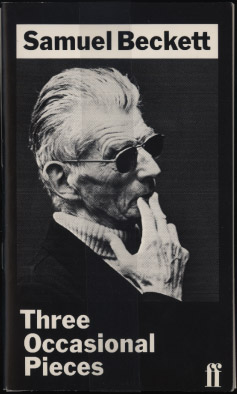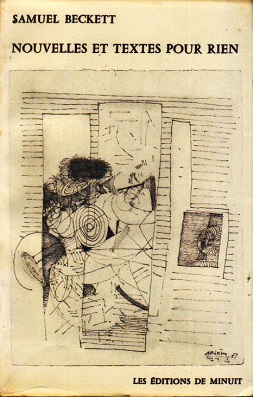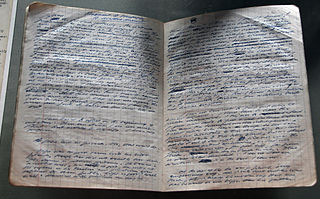Related Research Articles

Samuel Barclay Beckett was an Irish novelist, dramatist, short story writer, theatre director, poet, and literary translator. His literary and theatrical work features bleak, impersonal and tragicomic experiences of life, often coupled with black comedy and nonsense. His work became increasingly minimalist as his career progressed, involving more aesthetic and linguistic experimentation, with techniques of stream of consciousness repetition and self-reference. He is considered one of the last modernist writers, and one of the key figures in what Martin Esslin called the Theatre of the Absurd.

Waiting for Godot is a play by Irish playwright Samuel Beckett in which two characters, Vladimir (Didi) and Estragon (Gogo), engage in a variety of discussions and encounters while awaiting the titular Godot, who never arrives. Waiting for Godot is Beckett's reworking of his own original French-language play, En attendant Godot, and is subtitled "a tragicomedy in two acts".
Act Without Words I is a short play by Samuel Beckett. It is a mime, Beckett's first. Like many of Beckett's works, the play was originally written in French, being translated into English by Beckett himself. It was written in 1956 following a request from the dancer Deryk Mendel and first performed on 3 April 1957 at the Royal Court Theatre in London. On that occasion it followed a performance of Endgame. The original music to accompany the performance was written by composer John S. Beckett, Samuel's cousin, who would later collaborate with him on the radio play Words and Music.
Play is a one-act play by Samuel Beckett. It was written between 1962 and 1963 and first produced in German as Spiel on 14 June 1963 at the Ulmer Theatre in Ulm-Donau, Germany, directed by Deryk Mendel, with Nancy Illig (W1), Sigfrid Pfeiffer (W2) and Gerhard Winter (M). The first performance in English was on 7 April 1964 at the Old Vic in London. It was not well-received upon its British premiere.

Come and Go is a short play by Samuel Beckett. It was written in English in January 1965 and first performed at the Schillertheater, Berlin on 14 January 1966. Its English language premiere was at the Peacock Theatre, Dublin on 28 February 1968, and its British premiere was at the Royal Festival Hall in London on 9 December 1968. It was written for and dedicated to the publisher John Calder.
Catastrophe is a short play by Samuel Beckett, written in French in 1982 at the invitation of A.I.D.A. and “[f]irst produced in the Avignon Festival … Beckett considered it ‘massacred.’” It is one of his few plays to deal with a political theme and, arguably, holds the title of Beckett's most optimistic work. Beckett "wrote the short play Catastrophe about control and censorship" and dedicated it to the Czech dramatist Václav Havel, who was in prison at the time. Havel wrote a play called Mistake "as a response to the one Beckett had written in solidarity." "In February 1984, in one of the most significant milestones in the history of Index on Censorship, both plays were published for the first time." In January 2022, after almost 38 years, in 50th birthday celebration of Index, they asked "Iranian playwright Reza Shirmarz to write his own response to Beckett's Catastrophe." Shirmarz wrote his play Muzzled which was published by Index as a dramatic response to Beckett's Catastrophe. Giving his viewpoints on Beckett's play in an interview with Index, Shirmarz said that "Catastrophe is about censored communication, the ritualistic representation and the symbolic image of human relationship constrained by external forces, a deterministic, political and post-dramatic text which demonstrates how humans are coerced to be and live in a torturous limbo. [In Catastrophe], Beckett's Protagonist is deprived of free will by the systems surrounding him and the systematic control imposed by others, except at the moment he moves his head up and looks at the spectators. Despite his psychosomatic pain, he talks through his silence and protests through his immobility. As so-called social factors and audiences, we are reminded by the playwright that we are not able to get out of the cage the sociopolitical conventions have imprisoned us in and we must abide by the unbreachable laws brought in by the global structures and conglomerates in order to survive."
Act Without Words II is a short mime play by Samuel Beckett, his second. Like many of Beckett's works, the piece was originally composed in French, then translated into English by Beckett himself. Written in the late 1950s it opened at the Clarendon Press Institute in Oxford and was directed by John McGrath. London premiere was directed by Michael Horovitz and performed at the Institute of Contemporary Arts, on 25 January 1960. The first printing was in New Departures 1, Summer 1959.

A Piece of Monologue is a fifteen-minute play by Samuel Beckett. Written between 2 October 1977 and 28 April 1979 it followed a request for a “play about death” by the actor David Warrilow who starred in the premiere in the Annex at La MaMa Experimental Theatre Club, New York on 14 December 1979.

Company is a novella by Samuel Beckett, written in English and published by Calder Publishing in 1979. It was translated into French by the author and published by Les Éditions de Minuit in 1980. Company was Beckett's first work of prose in over 30 years that was originally written in English.
That Time is a one-act play by Samuel Beckett, written in English between 8 June 1974 and August 1975. The play was specially written for actor Patrick Magee, who delivered its first performance on the occasion of Beckett's seventieth birthday celebration, at London's Royal Court Theatre on 20 May 1976.
Samuel Beckett wrote the radio play, Words and Music between November and December 1961. It was recorded and broadcast on the BBC Third Programme on 13 November 1962. Patrick Magee played Words and Felix Felton, Croak. Music was composed especially by John S. Beckett. The play first appeared in print in Evergreen Review 6.27. Beckett himself translated the work into French under the title Paroles et Musique.

From An Abandoned Work, a "meditation for radio" by Samuel Beckett, was first broadcast on BBC Radio 3’s Third Programme on Saturday, 14 December 1957 together with a selection from the novel Molloy. Donald McWhinnie, who already had a great success with All That Fall, directed the Irish actor Patrick Magee.

Stories and Texts for Nothing is a collection of stories by Samuel Beckett. It gathers three of Beckett's short stories and the thirteen short prose pieces he named "Texts for Nothing" (1950–1952). All of these works are collected in the Grove Press edition of Beckett's complete short prose. They were originally written in French and published in 1955 by Les Éditions de Minuit as Nouvelles et Textes pour rien, with a second edition illustrated edition published by the same publisher in 1958.

Embers is a radio play by Samuel Beckett. It was written in English in 1957. First broadcast on the BBC Third Programme on 24 June 1959, the play won the RAI prize at the Prix Italia awards later that year. Donald McWhinnie directed Jack MacGowran – for whom the play was specially written – as "Henry", Kathleen Michael as "Ada" and Patrick Magee as "Riding Master" and "Music Master". The play was translated into French by Beckett himself and Robert Pinget as Cendres and was published in 1959 by Les Éditions de Minuit. The first stage production was by the French Graduate Circle of Edinburgh, Edinburgh Festival, 1977."
Rough for Radio I is a short radio play by Samuel Beckett, written in French in 1961 and first published in Minuit 5 in September 1973 as Esquisse radiophonique. Its first English publication as Sketch for Radio Play was in Stereo Headphones 7. It first appeared under its current title in Ends and Odds.

Cascando is a radio play by Samuel Beckett. It was written in French in December 1961, subtitled Invention radiophonique pour musique et voix, with music by the Franco-Romanian composer Marcel Mihalovici. It was first broadcast on France Culture on 13 October 1963 with Roger Blin (L'Ouvreur) and Jean Martin. The first English production was on 6 October 1964 on BBC Radio 3 with Denys Hawthorne (Opener) and Patrick Magee (Voice).
The Old Tune is a free translation of Robert Pinget’s 1960 play La Manivelle in which Samuel Beckett transformed Pinget's Parisians, Toupin and Pommard into Dubliners, Cream and Gorman. Its first radio broadcast was by the BBC Third Programme on 23 August 1960, directed by Barbara Bray with Jack MacGowran as Cream and Patrick Magee as Gorman.

The Complete Short Prose 1929–1989 is a collection which includes all of Samuel Beckett's works written in prose, with the exception of his novels, novellas from Nohow On, and More Pricks Than Kicks which is considered "as much a novel as a collection of stories". The book was edited by S. E. Gontarski and published by Grove Press in 1995.
"neither" is a very short story by Samuel Beckett written in 1976 and originally published in the Journal of Beckett Studies No. 4. The title is uncapitalized, and the story is composed of only eighty-seven words, divided into ten lines, and has no punctuation except for three commas.

Francis Beckett is an English author, journalist, biographer, and contemporary historian. He has written biographies of Aneurin Bevan, Clement Attlee, Harold Macmillan, Gordon Brown and Tony Blair. He has also written on education for the New Statesman, The Guardian and The Independent and is the editor of Third Age Matters, the national magazine published by the University of the Third Age. Beckett has been described as "an Old Labour romantic" by Guardian associate editor Michael White.
References
- ↑ Van Hulle, Dirk (1 March 2004). "Sans". The Literary Encyclopedia.
- ↑ Brater, Enoch (2011). "From Dada to Didi: Beckett and the Art of His Century". Ten Ways of Thinking About Samuel Beckett. London: Methuen Drama. ISBN 978-1408137222.